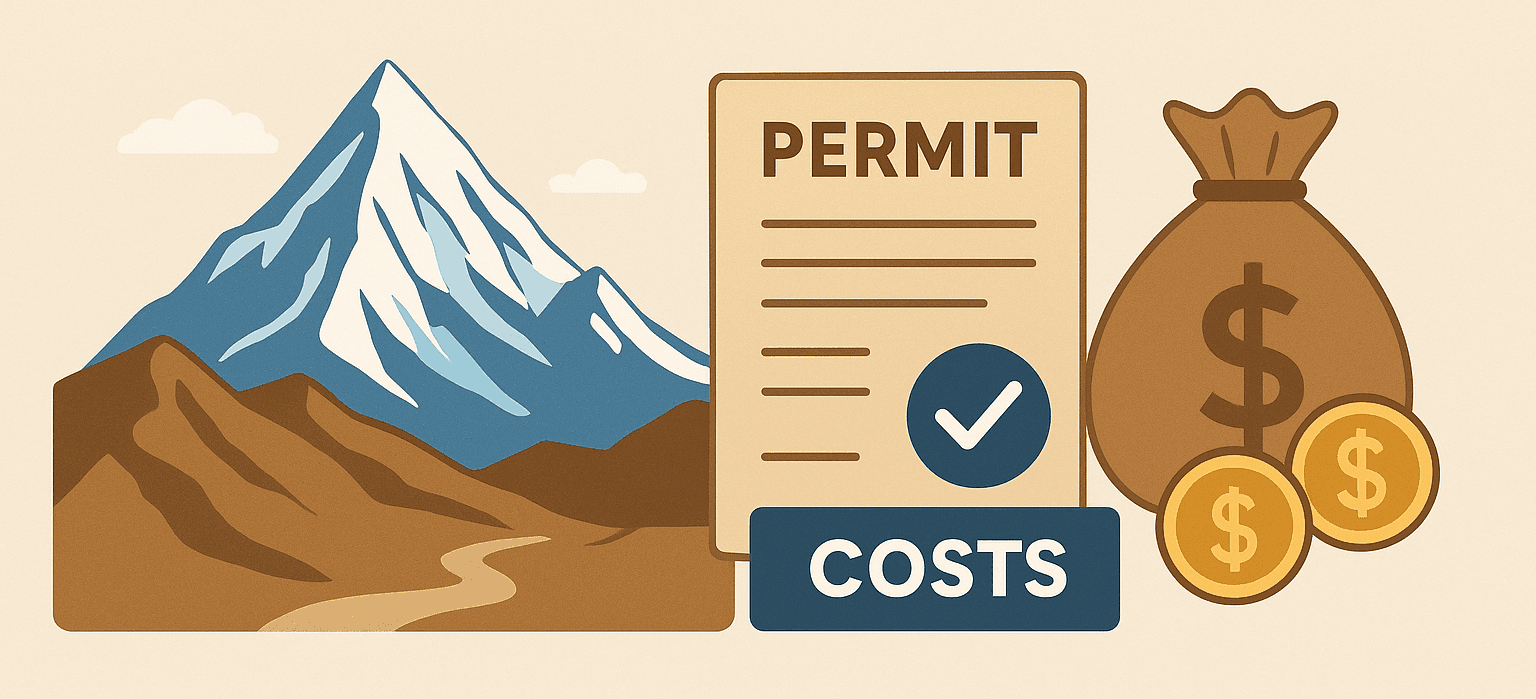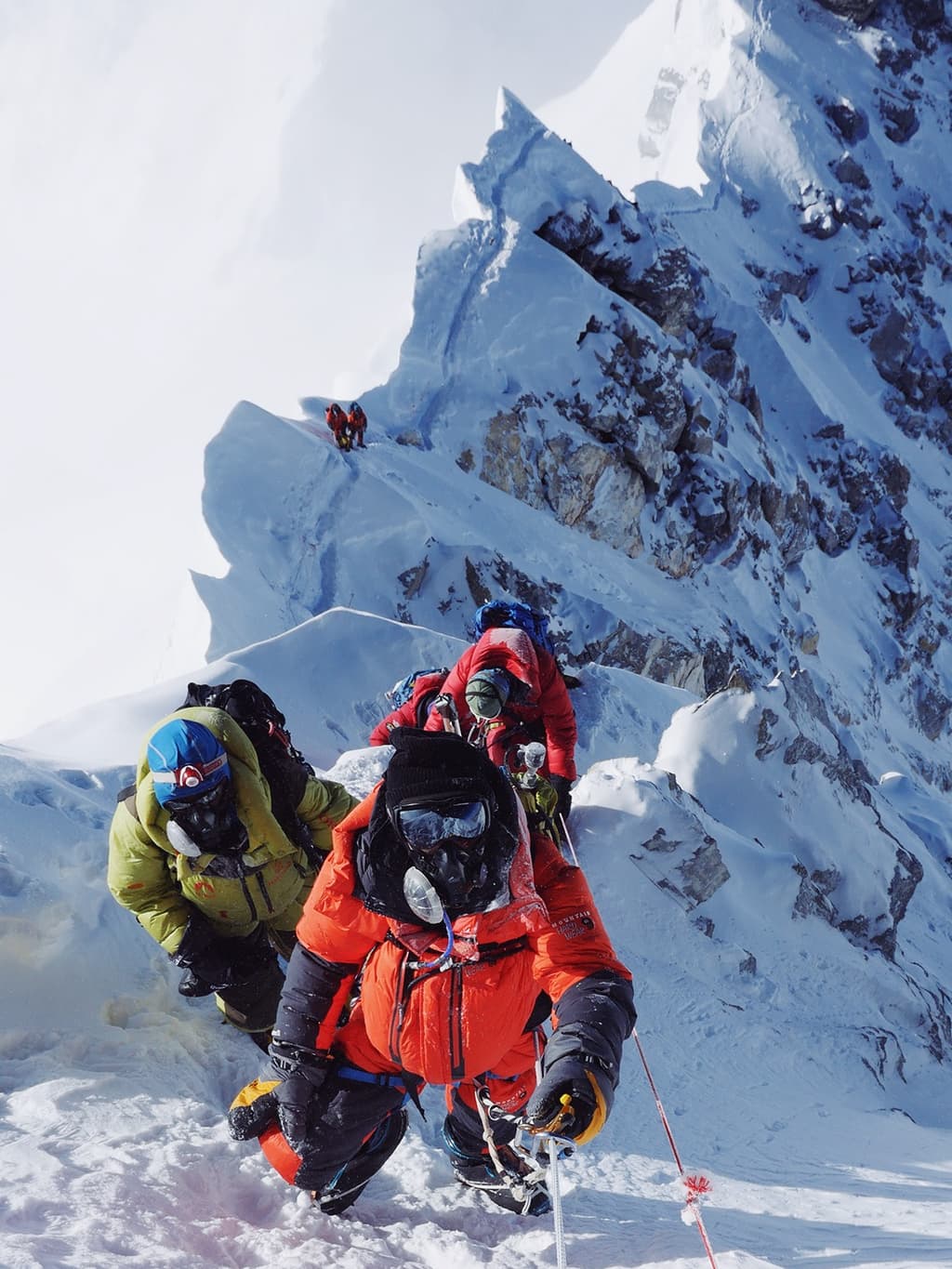Planning to climb Island Peak in Nepal? This guide from Everest Sherpa Expeditions breaks down everything you need to know about permits and costs for your high-altitude adventure. Perfect for aspiring mountaineers and trekkers looking to summit this popular 6,189m Himalayan peak.
Island Peak (Imja Tse) requires specific permits and careful budgeting. Our comprehensive breakdown covers all required legal documentation, the complete cost structure from permits to equipment rental, and the expedition logistics you'll need to plan for.
Required Permits for Island Peak
Your Island Peak climb requires several official permits that we handle for you:
- Island Peak climbing permit: $250 (spring season) or $125 (autumn season)
- Sagarmatha National Park entry fee: $30
- Khumbu Pasang Lhamu Rural Municipality fee: $20
- TIMS card: $10
- Garbage deposit: $500 (refundable according to Nepal Mountaineering Association rules)
Complete Cost Breakdown
Our Island Peak climbing packages range from $1,800 to $2,500, depending on group size and service level. This base price includes:
- All necessary climbing permits
- Airport transfers and domestic flights
- Accommodations during the trek and in Kathmandu
- Full board meals throughout the expedition
- Experienced climbing guides (1:2 ratio)
- Group climbing equipment and emergency supplies
Additional costs to budget for include international flights ($800-1,200), personal gear, tips for guides ($150-200), and mandatory travel insurance with high-altitude coverage.
Let us help you plan your Island Peak adventure with expert guidance, proper preparation, and all necessary permits.
Understanding Island Peak Climbing Fundamentals
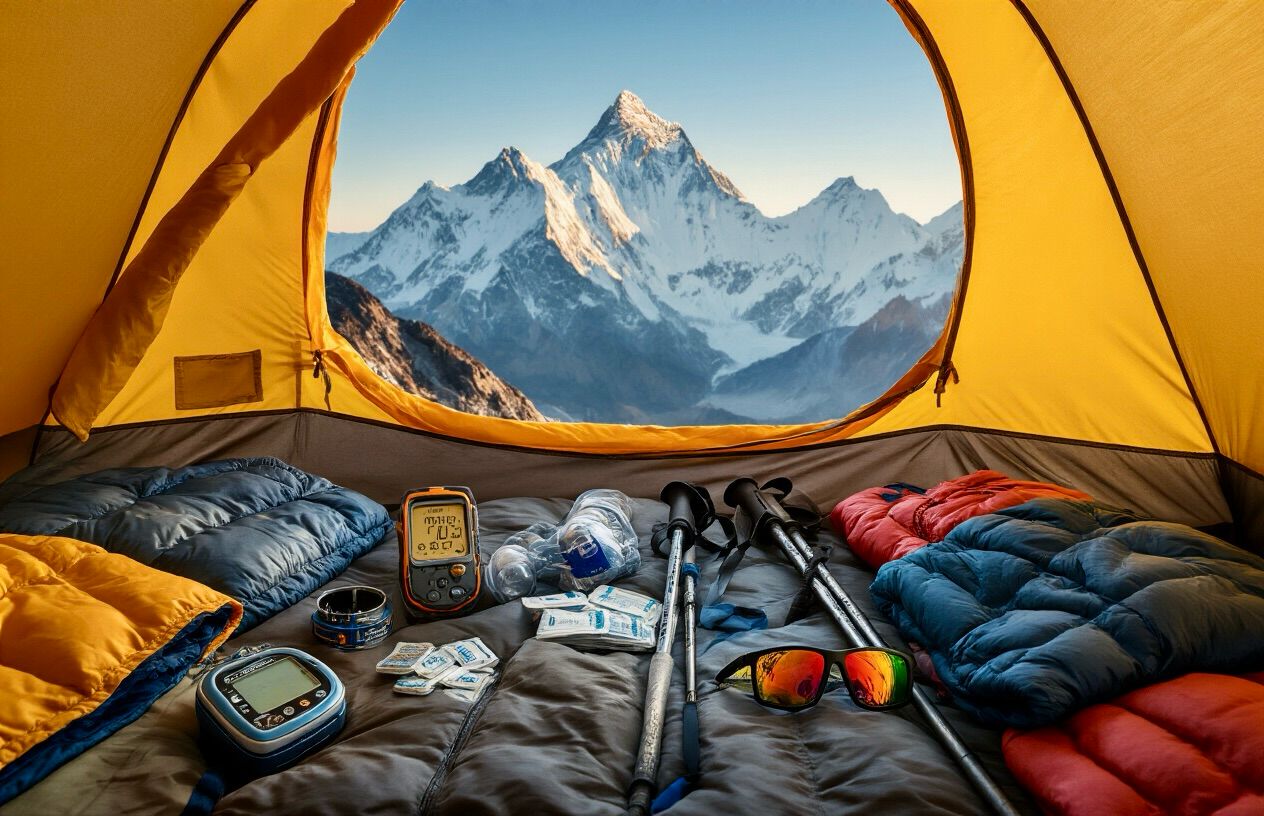
Peak Specifications and Unique Features at 6,189 Meters Elevation
Island Peak, also known as Imja Tse, stands majestically at 6,189 meters (20,305 feet) above sea level. True to its name, the peak appears as an island rising from a sea of ice, creating a distinctive silhouette against the Himalayan skyline. Climbers who reach its summit are rewarded with spectacular panoramic views of some of the world's highest mountains, including Everest, Lhotse, Nuptse, and Makalu.
The climbing route features several unique challenges, including an exhilarating glacier crossing that tests your technical skills and a thrilling final headwall that requires navigating fixed ropes to reach the summit ridge.
Difficulty Assessment and Required Mountaineering Skills
Island Peak falls into the "moderately difficult" category and is officially classified as a trekking peak. However, don't be misled by this classification—the climb demands specific skills and preparation:
- Previous high-altitude trekking experience (4500m+)
- Basic snow and ice climbing proficiency
- Excellent physical fitness (ability to sustain 6-8 hours of daily walking)
- Mental stamina for the challenging summit push
The most technically demanding sections include a 100-meter headwall with slopes reaching 45 degrees and the exposed final ridge traverse leading to the summit. To navigate these challenges safely, climbers must be comfortable using:
- Crampons and ice axes
- Harnesses and carabiners
- Fixed lines and rope systems
- Jumar ascending devices
- Glacier travel techniques
- Basic crevasse rescue knowledge
Optimal Climbing Seasons and Weather Considerations
The climbing calendar for Island Peak is dictated by the region's weather patterns:
Pre-monsoon (Spring): March to May
- Stable weather patterns
- Warmer temperatures
- Beautiful rhododendron blooms along lower sections
- Busier trails and higher climber traffic
Post-monsoon (Autumn): September to November
- Clearest skies with exceptional visibility
- Cooler temperatures
- Highly stable weather conditions
- Less crowded than spring season
Summer climbs during June-August are generally not recommended due to monsoon conditions that bring heavy rain, snow, and significantly increased danger levels.
Why Everest Sherpa Expeditions Leads in Success Rates
With over 15 years of guiding experience on Island Peak, Everest Sherpa Expeditions has established itself as the premier outfitter for this climb, boasting an impressive 93% summit success rate and a perfect safety record. Our leadership position stems from:
- Teams led by certified Sherpa guides with multiple Everest summits
- Small group sizes (maximum 6 climbers per guide) ensure personalized attention
- Comprehensive pre-climb training on glacier travel and fixed-rope techniques
- Premium quality equipment and rigorous safety protocols
- Flexible itineraries optimized for proper acclimatization
- Authentic cultural experiences that enhance your Himalayan journey
Our local expertise and deep understanding of the mountain's conditions provide climbers with the highest probability of summit success while maintaining an unwavering commitment to safety.
Complete Cost Breakdown and Permit Requirements
Base package pricing from $2,450 with comprehensive inclusions
Our Island Peak climbing package starts at $2,450 per person, offering excellent value with numerous inclusions. This comprehensive package covers:
- Airport transfers in Kathmandu
- 3 nights accommodation in Kathmandu (3-star hotel)
- All ground transportation
- Domestic flights (Kathmandu-Lukla-Kathmandu)
- Full board meals during the trek and climb
- Teahouse/lodge accommodations throughout the trek
- Camping equipment at Island Peak base camp
- Experienced climbing Sherpa guide (1:2 ratio)
- Porters to carry group equipment
- All necessary climbing permits
- Group climbing gear (ropes, ice screws)
- Emergency oxygen and medical kit
- All government taxes and official fees
Essential permits and government fees totaling $310 per person
When climbing Island Peak, several permits and fees are required, all of which are included in our base package:
- Island Peak climbing permit: $250 per person (spring season)
- Sagarmatha National Park entry fee: $30
- Khumbu Pasang Lhamu Rural Municipality fee: $20
- TIMS card: $10
Additional expenses and hidden costs to budget for
Beyond the base package, climbers should budget for these additional expenses:
- International flights to Nepal ($800-$1,200)
- Nepal visa fee ($50 for 30 days)
- Personal climbing gear rental (if needed)
- Additional nights in Kathmandu ($40-100/night)
- Personal expenses and souvenirs
- Tips for guides and porters ($150-200 recommended)
- Extra snacks and beverages beyond provided meals
- Hot showers in higher elevation teahouses ($5-10)
- Battery charging at lodges ($3-5 per device)
- Travel and rescue insurance (mandatory)
Equipment rental options and complete gear packages
For climbers who don't want to purchase or transport all necessary equipment, we offer rental options:
|
Equipment |
Rental Price |
|
Down suit |
$150 |
|
Sleeping bag (-20°C) |
$80 |
|
Ice axe |
$40 |
|
Crampons |
$40 |
|
Climbing boots |
$70 |
|
Harness |
$30 |
|
Jumar/ascender |
$20 |
|
Helmet |
$25 |
|
Complete package |
$350 |
Cost comparison with budget and premium operators
|
Operator Type |
Base Price |
Group Size |
Service Level |
Success Rate |
|
Everest Sherpa Expeditions |
$2,450 |
Max 12 |
All-inclusive (1:2 guide ratio) |
85% |
|
Budget Operators |
$1,800-2,000 |
15-20 |
Basic services (limited support) |
60-70% |
|
Premium Agencies |
$3,000-3,500 |
6-8 |
Luxury accommodations (1:1 guide) |
85-90% |
|
International Operators |
$3,500-4,500 |
8-10 |
Western leader + local guides |
80-85% |
As evident from the comparison, Everest Sherpa Expeditions offers an optimal balance of reasonable pricing, manageable group size, comprehensive services, and a strong success rate compared to both budget and premium alternatives.
Required Permits and Legal Documentation
Island Peak Climbing Permit Fees by Season
Climbing Island Peak requires obtaining the appropriate permits, which vary in cost depending on the season you choose for your expedition:
- Spring season (March-May): $250 per person
- Autumn season (September-November): $125 per person
Note that the spring season permit costs twice as much as the autumn season, reflecting the popularity and optimal climbing conditions during this period.
Sagarmatha National Park Entry Requirements
Since Island Peak is located within the Sagarmatha National Park, all climbers must obtain an entry permit:
- Entry fee: $30 per person
This permit is mandatory and must be arranged before entering the park boundaries.
TIMS Card and Municipality Fees
Two additional permits are required for trekking in the Khumbu region:
- Khumbu Pasang Lhamu Rural Municipality fee: $20 per person
- TIMS card (Trekkers' Information Management System): $10 per person
These permits help manage tourist flow and contribute to local development and conservation efforts.
Garbage Deposit Requirements and Refund Policies
To maintain the pristine environment of the Himalayas, climbers must comply with waste management regulations:
- A garbage deposit of USD 500.00 is mandatory to obtain a climbing permit
- The refund process follows the provisions established by the Nepal Mountaineering Association (NMA)
- The deposit is returned after verification that you've brought back all your waste
Visa Requirements and Processing for Nepal Entry
Before starting your Island Peak expedition, you'll need to enter Nepal legally:
- Most nationalities can obtain a visa-on-arrival at Tribhuvan International Airport in Kathmandu
- Requirements include:
- Valid passport with at least 6 months' validity remaining
- Completed visa application form
- Passport-sized photograph
- Visa fee in cash (US dollars are recommended)
Current visa fees:
- 15-day visa: $30
- 30-day visa: $50
- 90-day visa: $125
To save time upon arrival, it's recommended to complete the online application through the Nepal Immigration website before your trip, which will help you avoid long queues at the airport.
Day-by-Day Expedition Itinerary and Acclimatization

Kathmandu preparation and flight to Lukla logistics
Day 1: Arrival in Kathmandu (1,400m)
Your Island Peak expedition begins in Kathmandu with airport transfer and hotel check-in. The day includes a comprehensive expedition briefing, thorough gear check, and final preparations before heading to the mountains.
Day 2: Kathmandu to Lukla Flight and Trek to Phakding (2,651m)
An early morning flight takes you to Lukla's dramatic airstrip, where you'll meet your porters and begin your Himalayan journey. The first day's trek is a relatively easy downhill path to Phakding, designed to initiate gradual acclimatization.
Trek progression from Phakding to Island Peak Base Camp
Day 3: Phakding to Namche Bazaar (3,440m)
The trek follows the Dudh Koshi River, crossing multiple suspension bridges. You'll face a challenging uphill climb to reach Namche Bazaar, where you'll be rewarded with your first glimpses of Mount Everest.
Strategic acclimatization days in Namche and Dingboche
Day 4: Acclimatization Day in Namche (3,440m)
Following the crucial "climb high, sleep low" principle, you'll hike to Everest View Hotel for magnificent panoramas before returning to Namche for the night.
Day 5: Namche to Tengboche (3,870m)
This segment offers superb panoramic views of iconic peaks, including Ama Dablam, Lhotse, and Everest. The trail leads to Tengboche, home to a significant monastery worth visiting.
Day 6: Tengboche to Dingboche (4,410m)
After descending to the Imja Khola river, you'll climb upward into the alpine landscape of Dingboche.
Day 7: Acclimatization Day in Dingboche (4,410m)
This rest day includes a hike up a nearby ridge, offering spectacular views of Island Peak and surrounding Himalayan giants while helping your body adapt to the altitude.
Day 8: Dingboche to Chhukung (4,730m)
A short climb brings you to Chhukung, the final village before Base Camp. Here, you'll begin preparing your climbing equipment for the summit push.
Day 9: Chhukung to Island Peak Base Camp (5,200m)
The trek traverses moraines and glacial valleys to reach Island Peak Base Camp, where you'll set up tents and begin summit preparations.
Day 10: Base Camp Acclimatization (5,200m)
This day serves the dual purpose of technical training and final acclimatization before your summit attempt.
The entire itinerary is carefully designed for gradual ascent, with guides continuously monitoring for altitude-related symptoms.
Pre-summit training and technical skills development
Day 10: Pre-summit Training Day
Your climbing guides will conduct comprehensive training sessions covering essential mountaineering skills. These include rope techniques, proper crampon use, and safety procedures, all practiced on terrain similar to what you'll encounter during the summit push.
Summit push strategy and contingency planning
Evening Preparation (Day 10)
After an early dinner, you'll complete final gear checks and pack essentials including headlamps, batteries, water, snacks, and climbing gear.
Summit Push (Day 11)
The day begins with an alpine start around 1:00 AM and a light breakfast. You'll climb in darkness by headlamp, maintaining a steady pace to High Camp (5,600m). After a brief rest, you'll put on crampons and harnesses before crossing the glacier. The team travels roped together for safety across the glacier to reach the headwall. You'll use fixed ropes to ascend the challenging 45-degree headwall, followed by the final ridge traverse to the summit (6,189m). The goal is to reach the summit by mid-morning, followed by a careful descent to Base Camp.
Contingency Plans
The expedition includes two buffer days (Days 12-13) for weather delays. The team receives daily weather forecasts via satellite communication, and summit attempts are postponed if conditions are unfavorable. Safety remains the absolute priority—the team may turn back if a safe summit within the contingency window isn't possible.
Essential Training and Preparation Requirements
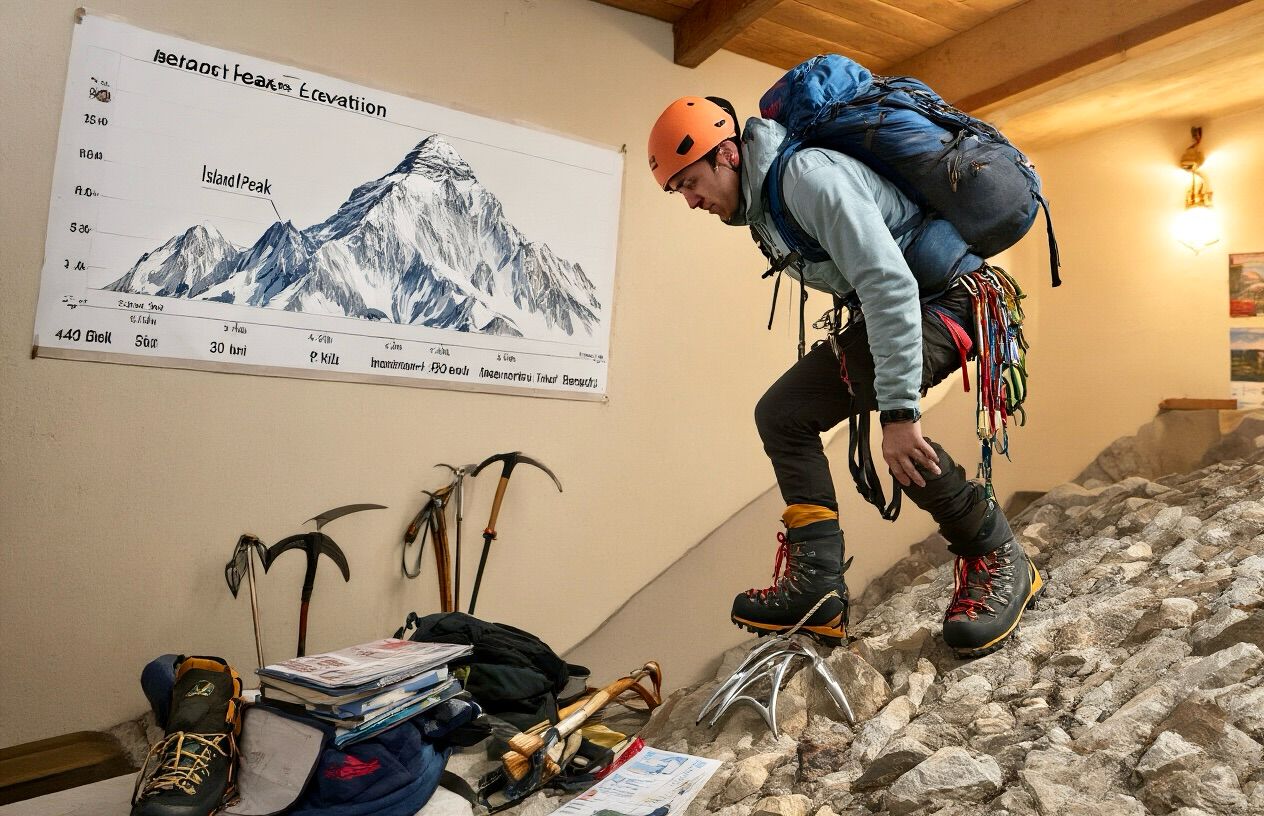
Physical Fitness Training Program for 3-4 Months
Preparing for Island Peak requires dedicated physical conditioning. Begin your training regimen at least 3-4 months before your expedition. Focus on cardiovascular exercises, including running, cycling, and swimming, for 30-45 minutes, 4-5 times weekly to build endurance.
Incorporate stair climbing with a loaded backpack to simulate the climbing conditions you'll face. Strength training is equally important—concentrate on exercises targeting your legs, core, and upper body. Include squats, lunges, step-ups, planks, Russian twists, push-ups, and pull-ups in your routine.
For advanced preparation, consider training at altitude or using an elevation mask to prepare your body for lower oxygen conditions. Weekend hikes with a loaded pack (15-20kg) will build real-world endurance and familiarize you with carrying weight over extended periods.
Technical Climbing Skills Including Crampon and Rope Work
Island Peak demands specific mountaineering skills. You'll need proficiency in:
- Crampon use on various terrains
- Ice axe handling, including self-arrest techniques
- Rope management for fixed lines
- Jumar (ascending device) techniques
- Proper harness and carabiner handling
While pre-climb training is available at base camp, having prior experience gives you a significant advantage. Practice tying essential knots and setting up your harness at home to build confidence before arrival.
Complete Gear Checklist for Personal and Climbing Equipment
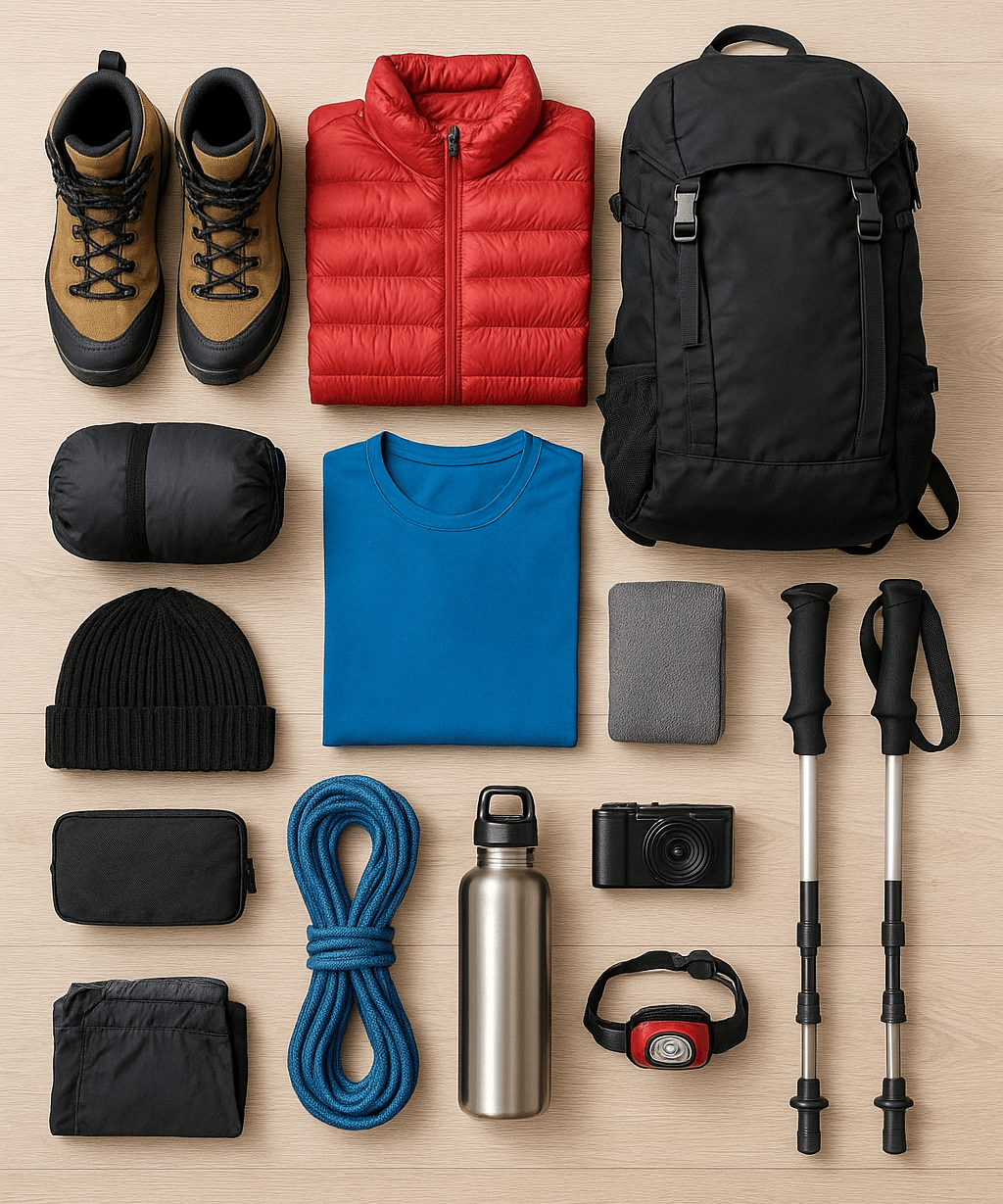
Climbing Gear
- Harness
- Helmet
- Crampons
- Ice axe
- Jumar
- 3-4 carabiners
- Figure-8 descender
Clothing
- Down jacket
- Waterproof outer layers
- Thermal underwear
- Multiple glove layers
- Warm hat
- Sun hat
Footwear
- Double plastic or hybrid mountaineering boots
- Hiking boots for the approach
Accessories
- Headlamp with spare batteries
- Water bottles (minimum 2L)
- Sun protection (SPF 50+)
- Glacier glasses
Personal Items
- Medications
- Toiletries
- Quick-dry towel
- Sleeping bag (rated to -20°C)
Altitude Sickness Prevention and Health Preparations
Your expedition itinerary includes strategic acclimatization days to help your body adapt to higher elevations. Maintain constant hydration by drinking 4-5 liters daily. Follow the "climb high/sleep low" principle and maintain a moderate pace throughout the ascent.
Consider consulting your doctor about Diamox (acetazolamide) for altitude sickness prevention. Remain vigilant for symptoms such as headache, nausea, and dizziness. Be honest with your guides about how you're feeling—there's no shame in communicating symptoms early.
Mental Preparation and Mountaineering Course Recommendations
Mental resilience is as crucial as physical preparation for Island Peak. Develop a positive mindset and regularly visualize successful summiting. The psychological challenges of high-altitude climbing can be significant, requiring determination and focus.
For climbers without previous mountaineering experience, completing a formal mountaineering course before attempting Island Peak is highly recommended. These courses provide hands-on training in the technical skills required for a safe and successful expedition.
Professional Services and Safety Protocols
Experienced Sherpa Guides with Everest Summit Credentials
Our expedition team features elite Sherpas with decades of high-altitude experience in the Everest region. Many of our guides have reached Everest's summit multiple times, bringing unparalleled knowledge to your Island Peak adventure. Beyond their technical expertise, these guides are passionate mountaineers committed to your safety and summit success. Our comprehensive support staff includes dedicated porters, skilled cooks, and efficient base camp managers who work together to enhance your expedition comfort.
Comprehensive Safety Measures and Emergency Procedures
Safety remains our paramount concern throughout your journey. Before attempting the climb, our team conducts thorough equipment inspections and essential training sessions to ensure your preparedness. Our guides continuously monitor weather patterns, making real-time decisions to maximize safety. We maintain constant communication via radio between teams and carry satellite phones for emergencies. Our expeditions are fully equipped with oxygen supplies, comprehensive first aid kits, and established evacuation protocols. For serious emergencies, we've arranged helicopter evacuation services with Kathmandu hospitals.
Accommodation Arrangements from Kathmandu to Base Camp
Your comfort throughout the expedition is carefully planned. We book comfortable hotels during your stay in Kathmandu and select the finest available tea houses along the trekking route. Once at higher elevations, our dedicated camp cook prepares nutritious meals to maintain your energy levels. We're happy to accommodate special dietary requirements when informed in advance, ensuring your nutritional needs are met throughout the journey.
Personalized Climbing Support and Flexible Itineraries
Every climber brings unique abilities and goals to Island Peak. Our support approach is tailored to your individual experience level, fitness condition, and personal objectives. We offer flexibility for additional acclimatization days or supplementary technical training as needed. During crucial climbing sections, our guides provide personalized coaching and adjust the pace to match your capabilities. Our adaptable itineraries are specifically designed to maximize both acclimatization and summit success.
Group Size Limitations and Guide-to-Climber Ratios
To ensure quality instruction and personalized attention, we maintain small expedition groups with a maximum of 6 climbers per guide. For the technical climbing sections, we provide an experienced Sherpa guide at a 1:2 ratio, ensuring you receive the focused support necessary for a safe and successful summit attempt. This conservative approach to group management significantly enhances both safety and your overall expedition experience.
Practical Travel Information and Logistics
Communication Facilities and Connectivity During Expedition
Most teahouses throughout the Khumbu region offer Wi-Fi services, though these come with a fee ranging from $3-5 per day. Cell phone coverage has significantly improved in recent years, making local SIM cards from providers like Ncell or NTC a practical option for travelers. While coverage extends to most villages along the trekking route, be prepared for spotty service once you ascend beyond Namche Bazaar. For critical situations during the mountain climb itself, expedition teams carry satellite phones to ensure emergency communication remains possible regardless of location.
Money Management and Tipping Guidelines for Staff
Nepalese Rupees in cash form is the preferred payment method throughout the Khumbu region. While there are ATMs in Namche Bazaar, their reliability can be questionable, so it's advisable to bring sufficient cash.
Daily expenses to anticipate include:
- Hot showers: $3-5
- Device charging: $2-5
- Wi-Fi access: $3-5
- Extra snacks and drinks: $5-10
Regarding tipping, while not mandatory, it is customary to show appreciation to your support team. Standard tipping guidelines suggest:
- Guides: $10-15 per day
- Climbing Sherpas: $10-15 per day
- Porters: $5-8 per day
These tips are typically collected and presented collectively at the end of your expedition.
Health Recommendations and Vaccination Requirements
A comprehensive medical check-up is recommended at least 2 months before your expedition. Several vaccinations are advised, including Hepatitis A and B, Typhoid, COVID-19, and a Tetanus booster.
Altitude sickness represents a significant health concern during the Island Peak expedition. The itinerary incorporates proper acclimatization days to mitigate this risk. Diamox (acetazolamide) is often suggested as a preventative measure after consultation with your doctor.
Transportation Options and Lukla Flight Considerations
Daily flights operate between Kathmandu and Lukla's Tenzing-Hillary Airport, with a flight time of 30-40 minutes, weather permitting. Since these flights are highly weather-dependent, delays are common, making buffer days in your schedule highly recommended.
Important flight details include:
- Baggage allowance: 45kg (combined checked and carry-on)
- Morning flights offer the best chance of operating without weather disruptions
Alternative transportation options include:
- Flying to Ramechhap (particularly during high season)
- Taking a jeep to Phaplu and trekking an additional 3 days to join the main route
Insurance Requirements Covering High-Altitude Evacuation
Comprehensive travel insurance with emergency evacuation coverage up to 6,000m is mandatory for all expedition participants, with estimated costs between $150-200. Your policy should include trip cancellation coverage and medical coverage with a minimum value of $50,000. This insurance requirement is non-negotiable due to the remote nature of the expedition and the potential costs associated with emergency medical evacuation from high altitudes.
The journey to the summit of Island Peak demands thorough preparation, both physically and financially. From the comprehensive cost breakdown of $1,800-$2,500 to the essential permits like the Island Peak climbing permit ($250 in spring, $125 in autumn), understanding all aspects of this expedition is crucial for success. Our carefully designed itinerary incorporates vital acclimatization days to maximize your summit chances while maintaining safety as the top priority. The physical training, technical skills, and proper equipment outlined in this guide form the foundation of your preparation.
Everest Sherpa Expeditions brings over 15 years of local expertise to your Island Peak adventure, offering small group sizes, comprehensive pre-climb training, and authentic cultural experiences. With our 93% summit success rate and perfect safety record, you're not just a client – you're part of our mountaineering family. Whether you're an experienced climber or taking on your first major Himalayan peak, the breathtaking panoramic views of Everest, Lhotse, Nuptse, and Makalu await you at the summit.
If you need any further information, please contact us by email: [email protected], Phone: +977- 980 195 6248 (WhatsApp).
